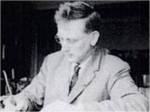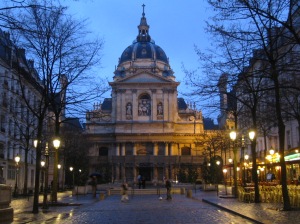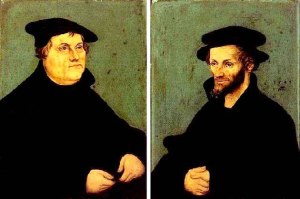A few days ago, May 25th, John Webster passed away. He was 60 years old. I heard about his sudden death at the Refo500RC Conference in Copenhagen. Home again, I soon found out that his death is lamented at various weblogs: here for example, here, here and also here. His passing away has attracted a lot of attention, and rightly so. Webster truly was an exceptional theologian.
However, in this post I want to pay attention to another theologian who recently died : the Rev. Dr. Thomas Henry Louis Parker. He died on Monday April 25th of this year, at the blessed age of 99 years. Parker was an outstanding scholar, both versed in Calvin Studies as well as in Barth Studies. His death has not attracted the same amount of attention as John Webster’s, but I gathered it was mentioned on Facebook, and also on the website of Refo500 and in this contribution by Lee Gatiss.
: the Rev. Dr. Thomas Henry Louis Parker. He died on Monday April 25th of this year, at the blessed age of 99 years. Parker was an outstanding scholar, both versed in Calvin Studies as well as in Barth Studies. His death has not attracted the same amount of attention as John Webster’s, but I gathered it was mentioned on Facebook, and also on the website of Refo500 and in this contribution by Lee Gatiss.
These contributions, valuable as they are, do not tell us much about his career. As far as I have been able to figure out, it looks like this:
1948-55 – Vicar of Brothertoft, Lincs.
1955-61 – Rector of Great and Little Ponton (near Grantham) Lincs.
1961-71 – Vicar of Oakington, Cambridge
1971-75 – University of Durham; Lecturer in Theology
1975-81 – University of Durham; Reader
T.H.L. Parker wrote important books about Calvin’s commentaries on the Old and New Testament. He edited some of Calvin’s commentaries and sermons. He wrote a concise, but very informative biography about Calvin. He published studies on Barth and was involved in the editing of the Church Dogmatics, together with T.F. Torrance.
Especially his books Calvin’s Preaching (a profound reworking of his earlier book The Oracles of God) really has been a revelation for me, from the moment I started to read it. There are not many books in my library that I have used more intensively than this book. Not only does it offer a wealth of information, but it captures my attention by its lively style of writing. Writing for example about the lost sermons of Calvin, which were removed from the Genevan library in the 19th century, he recounts that some of Calvin’s sermons were refound. He then continues:
“A few years later (1963) the pulse of life in my quiet country vicarage was quickened by the receipt of a letter from the Librarian of Lambeth Palace, saying that he had recently bought a manuscript volume of Calvin’s sermons on Genesis from Bristol Baptist College; would I please see them and pronounce on their authenticity. This, of course, I was only too willing to do.” (p.70)
About a year ago (March 2015) I unexpectedly came in touch with him by email, because I informed after him at BiblicalStudies.org. To my surprise the editor passed on an email [sic] of Dr. Parker himself. As a tribute to this outstanding scholar I’d like to cite a few sentences from this email, omitting the more personal details in it:
Twenty years ago I would have thought 98 was really very aged. Now that I am 98 it doesn”t seem much different from 58, 68, or 78, except, of course, that I can no longer indulge in the physical activities that I enjoyed then. I live on my own and more or less look after myself (…).
So, like the shepherd boy in Pilgrim’s Progress, I am content with what I have, little be it or much; and Lord contentment still I crave, because thou savest such.
Every good wish,
Yours sincerely,
T.H.L.Parker.
The last sentences really impressed me and made me glad because of the steadfast faith and hope that speaks out of it. This ‘shepherd boy’ has come home. We thank God for his life and work.







